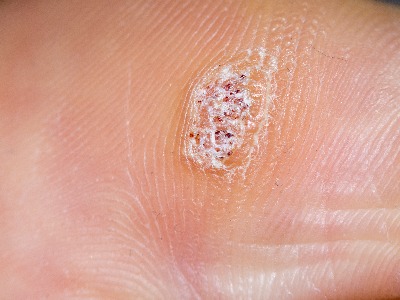Verruca Treatment in Weston-super-Mare: Prevention and Cure
If you’re struggling with verrucas, also known as plantar warts, my foot care service in Weston-super-Mare and North Somerset can help. Verrucas are common warts that appear on the soles of the feet due to the human papillomavirus (HPV). They often develop in areas under pressure and friction, making them both uncomfortable and persistent.
Understanding Verrucas
Verrucas are warts on the feet that can vary in size and shape but are typically rough and bumpy. They may have a hard surface and cause pain, especially when walking. HPV thrives in warm, moist environments like swimming pools and gyms. For more detailed information, the NHS offers a helpful resource on verrucas here.
Comprehensive Verruca Treatment in Weston-super-Mare
1. Diagnostic Approach
- Clinical Examination: I begin with a thorough examination to identify verrucas by their distinctive signs, such as tiny black dots, which are small blood vessels.
- Patient History: I’ll ask about the duration, severity, and impact of your verruca to tailor the best treatment plan for you. I’ll also take details of any other conditions you have including medications taken if applicable.
2. Treatment Options
Foot health professionals and podiatrists in Weston-super-Mare offer several effective treatments for verrucas:
- Cryotherapy: Liquid nitrogen freezes the verruca, causing the wart to die and fall off. This quick procedure often requires multiple sessions.
- Salicylic Acid Treatment: Applied as a gel or plaster, salicylic acid softens the verruca, allowing the infected skin to shed. It’s a non-invasive option that can be used at home or in the clinic.
- Electrotherapy: An electric current destroys the verruca tissue. This precise method is suitable for stubborn warts and is usually performed under local anaesthesia.
- Laser Treatment: A laser targets and destroys the verruca tissue. This method is highly effective for warts that resist other treatments and may require several sessions.
- Minor Surgery: For severe cases, surgical removal of the verruca under local anaesthesia offers a permanent solution.
- The very latest treatments as highlighted by the Royal College of Podiatry are: Microwave therapy, where the verruca has a microwave pulse transmitted through it and needling, where the complete area of the verruca is pricked with a needle to stimulate the body’s immune system.
Preventive Measures and Aftercare
- Preventing Spread: To avoid spreading verrucas, keep your feet clean and dry, avoid walking barefoot in communal areas, and do not share towels or footwear.
- Aftercare: Follow the aftercare instructions provided by your practitioner, which typically include keeping the area clean, avoiding pressure, and monitoring for infection or recurrence.
- Regular Check-Ups: Schedule follow-up appointments to ensure the verruca has been effectively treated and to check for any new issues.
Additional Tips for Managing Verrucas
Beyond professional treatment, there are several steps you can take at home to manage and prevent verrucas. Make sure you regularly inspect your feet for any signs of warts, and promptly address any issues to prevent them from worsening. It’s also helpful to keep your feet dry and avoid walking barefoot in communal areas like gym showers or swimming pools. Using a personal anti-fungal powder can also help reduce the risk of developing verrucas. Chemists are a useful source if information and will be able to direct you to a few products to select from.
Where Are The Common Places Where Verrucas Can Be Caught?
It’s useful to be aware and take precautions and avoiding walking barefoot in the common breeding grounds for Verrucas. The main culprit areas include:
- Public Swimming Pools: The damp surfaces around swimming pools are prime breeding grounds for HPV. Walking barefoot in these areas increases the risk of contracting verrucas.
- Gym Locker Rooms and Showers: These areas are often warm and moist, creating ideal conditions for HPV to spread. Walking barefoot in locker rooms or showers can lead to infection.
- Public Changing Rooms: Like locker rooms and swimming pool areas, public changing rooms can be breeding grounds for HPV. Shared benches and floors can contribute to the spread of verrucas.
- Shared Exercise Equipment: Using gym equipment that hasn’t been properly sanitized can also increase the risk of contracting verrucas.
- Public Footwear and Towel Sharing: Sharing towels or footwear with someone who has verrucas can transmit the virus.
- Hot Tubs and Saunas: These warm and moist environments can harbor HPV and increase the likelihood of infection.
When to Seek Professional Help
Consider professional verruca treatment in Weston-super-Mare if:
- The verruca is causing pain or discomfort.
- Over-the-counter treatments haven’t worked.
- You have multiple verrucas or recurring problems.
Rechelle’s Foot Care Services
I offer mobile foot care services in Weston-super-Mare and North Somerset, including verruca treatment. Whether you need routine check-ups, specialised care, or advice on footwear, I provide comprehensive foot health services in the comfort of your home. For complex cases, I can refer you to a GP or an experienced podiatrist. You can book an appointment with me here.
Rechelle Evans Dip FH, MCFHP MAFHP
Foot Health Professional
Mobile foot care in the comfort of your home.

